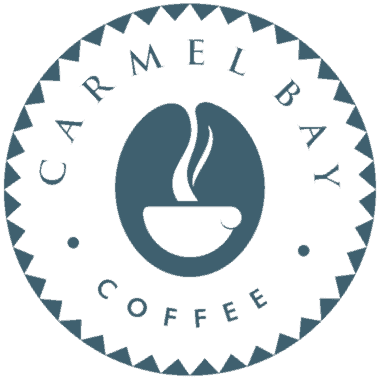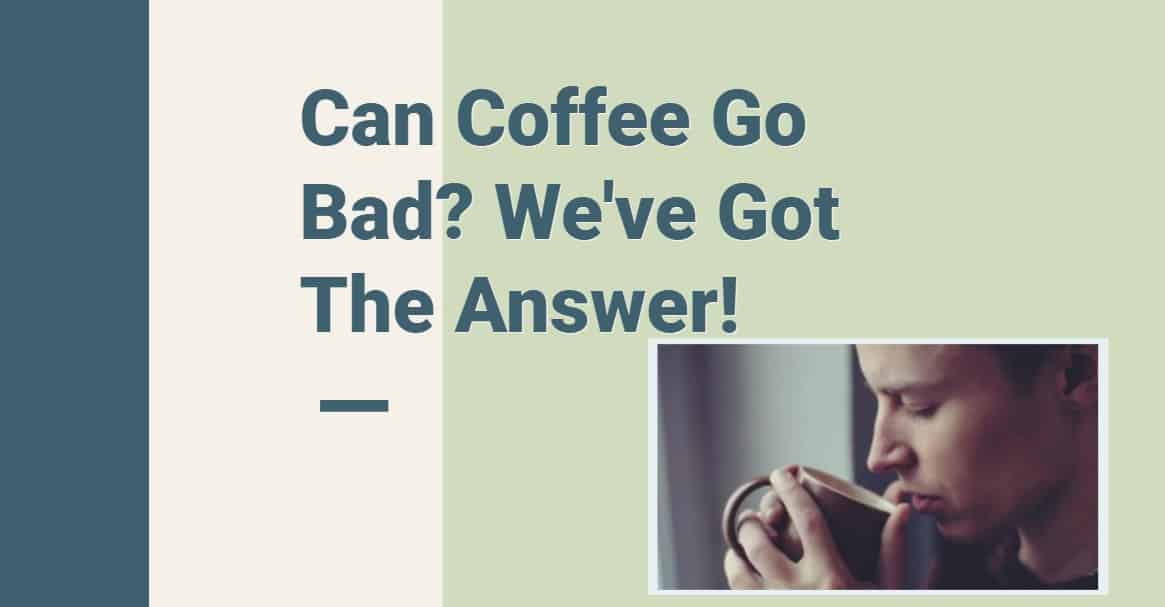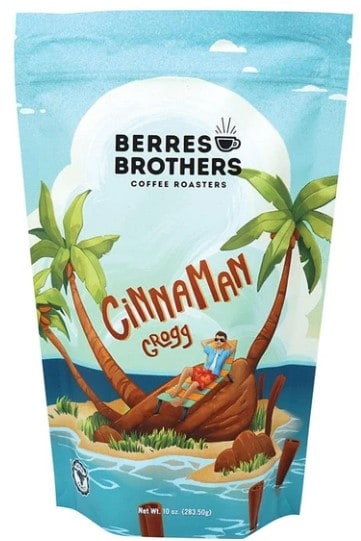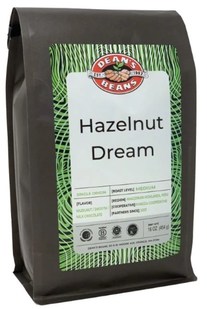Today we’re talking about flavored coffee and how it is made. So, I’m going to be throwing around many big chemistry words that make me appear smarter than I am.
The general process of flavoring coffee is relatively simple.
The coffee beans are roasted, cooled, and then slowly mixed in a tumbler until coated. Synthetic bonding elements are often used to fuse the flavor to the beans.
Before more elaboration about the process, let’s explore more about flavored coffee beans.
How Are Coffee Beans Flavored
Coffee beans are always roasted before flavoring. This gives the natural oils a chance to escape before adding other elements.
After roasting, it’s essential to let it cool before anything else. If the beans are too hot, specific properties of the flavoring will be destroyed.
Some companies will cool the beans using a process called water quenching. It’s a method that rapidly cools the beans by compressing them with water. This technique is not preferred, as it tends to dilute the natural notes.
High-end brands tend to dry their gourmet beans with steady streams of warm air, helping preserve any flavor they can.
The cooled and dried beans are then placed into a sizeable drum-like mixer.
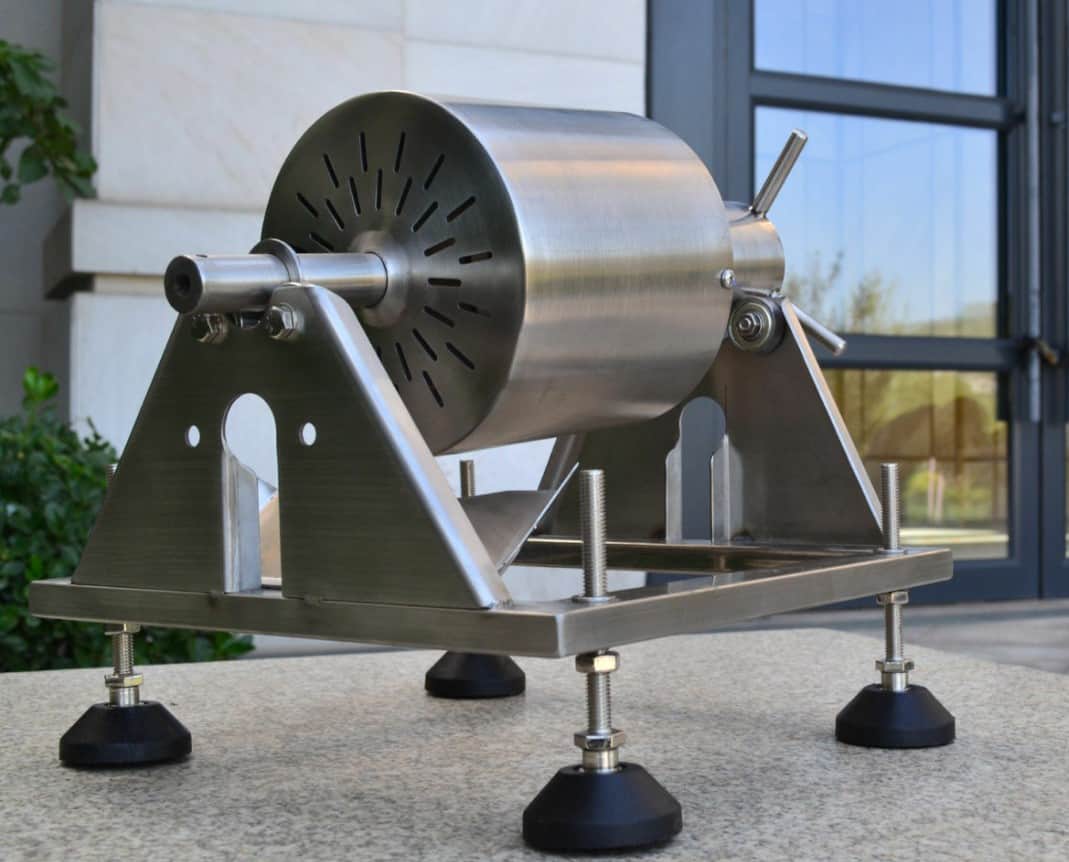
If you’d like to read more about the roasting process check out Giesen Coffee Roasters as they have a detailed article about their coffee roasting process.
As the beans tumble and mix, the flavoring is slowly drizzled in until thoroughly coated.
After proper mixing, the beans are ready to be packaged immediately. The key is to remove them from oxygen as quickly as possible.
Suppose you want to try something new, attempt roasting your own beans! Small kitchen mixers a very affordable and allow you to control the process from home!
Here’s a small coffee bean mixer for at home use here.
Are Flavored Beans Bad for You?
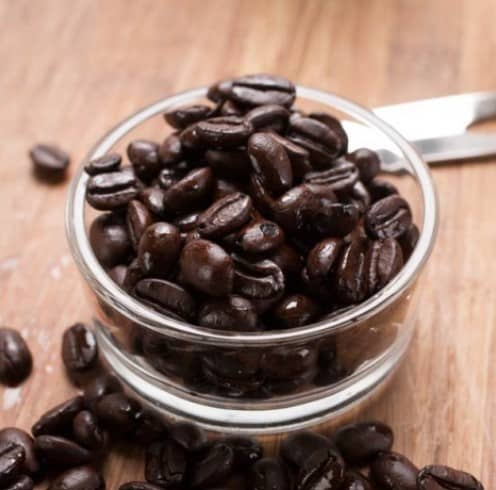
Nowadays, coffee comes in more flavors than your noggin can keep up with.
From classic French vanilla to quirky chocolate raspberry, very few stones have been left unturned within the delightful realm of flavored coffee. But since you can’t exactly grow a s’more’s flavored coffee bean, you’re left to wonder if the flavoring process can be treacherous to your health.
The answer to this is not a definitive one, as there are multiple variables at play.
For example, is the flavoring natural or artificial? It will tell you on the bag, but the flavor option itself will be a dead giveaway.
When we see “birthday cake flavored coffee beans,” we know it’s just a bunch of fancy-sounding chemicals replicating the taste of birthday cake.
But natural flavors such as vanilla, cinnamon, and hazelnut can be organically extracted straight from the source. This way, the natural oils are fueling the taste rather than synthetic chemicals.
Produce made with artificial fixings are always accompanied by a lengthy roster of complex chemicals that are impossible to pronounce. These flavors are nothing but imposters of the real thing.
These chemicals may cause complicated issues, including damage to your gut health if used inconsistent quantities over time.
So, if you decide to dabble with flavored beans or grounds, be sure to use a brand with natural ingredients.
Now, I’m going to let you in on a little secret. Coffee bean quality can be a deceiving illusion with flavored coffee products. It’s a common practice to flavor the more lower-grade beans.
Since coffee doesn’t really go bad, companies can use their older stale beans for the flavoring process.
Check out our article, Can Coffee Go Bad? We’ve Got The Answer! For further details about this.
When coffee ages, most of its flavors, aromas, and natural oils evaporate back into the universe leaving behind a bitter cup of joe. The added flavoring then masks the bitter bite.
Keep in mind that not every brand operates this way. For example, Deans Beans Organic Coffee Company sells flavored coffees only used from real ingredients. I’ll talk more about them later.
If you’re worried that flavors may be harmful, I have a simple rule of thumb: if you can’t pronounce it, don’t ingest it.
This rule can be applied to all food, but today we are talking coffee!
Only buy beans that have their flavor extracted from natural ingredients. Berry, vanilla, and even chocolate are perfect examples.
This way, you can ditch the chemicals that have names 20 syllables long.
Now, there’s one ingredient I’ve left out, and it’s an essential yet controversial step of the process.
Of course, I’m talking about the famous propylene glycol.
I’m sure you know all about it, and your friends bring it up all the time.
But just in case, this chemical is a bonding agent used to fuse the bean’s flavoring.
A quick google search will inform you why this is a controversial additive. This chemical is an active ingredient in antifreeze, and the FDA assesses it as “generally safe” to consume.
It’s definitely a little rough around the edges. But propylene is a component in most baking mixes that use synthetic flavoring. It’s not necessarily dangerous in sparse amounts, but people with liver or kidney issues should be extra cautious.
Does Flavored Coffee Contain Any Sugar or Calories
Well, if you’re talking about specialty coffee drinks, then most definitely. Those giant strawberry frappes at Starbucks are just glorified milkshakes.
Flavored coffee beans themselves surprisingly do not harbor any extra calories or contain sugar. Especially if flavors being used are naturally introduced.
The average cup of joe contains anywhere from 2-6 calories. These calories are from the oils extracted during roasting and brewing.
Keep in mind that flavored instant coffees tend to contain medium to high amounts of sugar.
Best Coffee Beans in Town!
Let me start by saying I’m very far from being a coffee expert. But I do love the stuff, so I tend to drink a lot of it.
For starters, I absolutely love Berres Brothers Coffee Roasters company. More specifically, their Cinnamon Grogg whole beans. These beans are on another level and use real cinnamon. The smell itself is enough to get you out of bed.
Deans Beans Organic Coffee gave me the best cup of hazelnut java I’ve ever had. The Hazelnut Dream is beyond delightful and flavored using real hazelnuts.
A lot of people make fun of Folgers. But I think it gets a bad rep. If you want to save a buck, go with Folgers: Black Silk. For a less expensive coffee, black silk knocks it out of the park.
